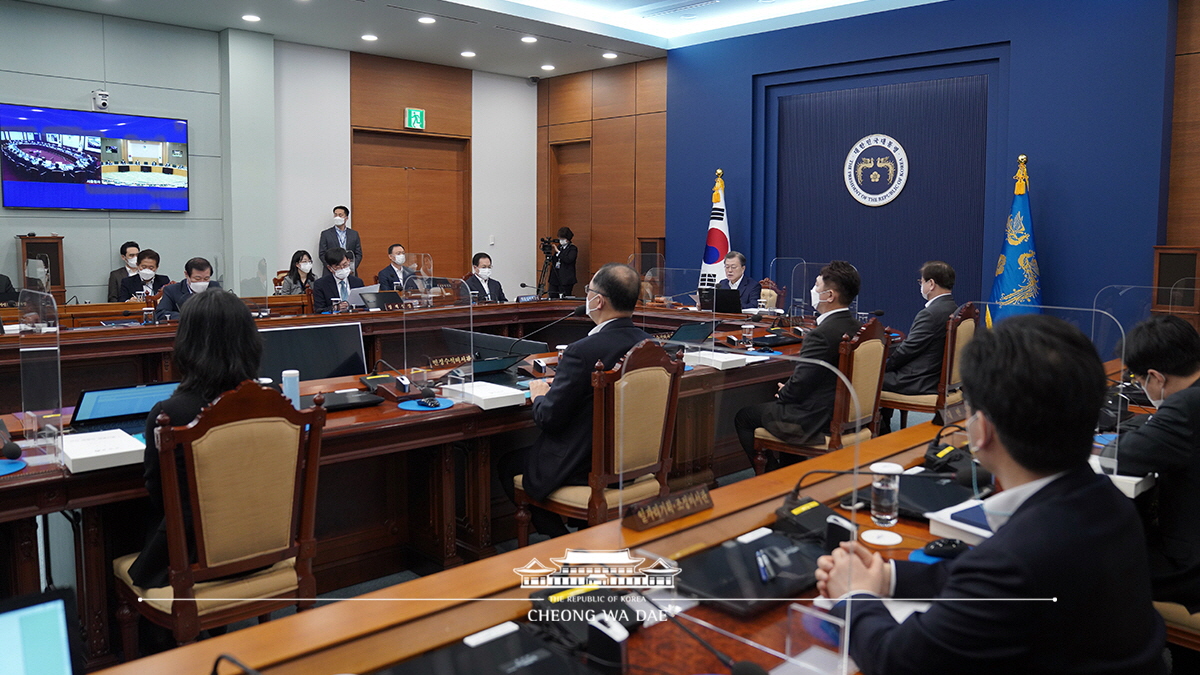이 웹사이트는 제19대 대통령 임기 종료에 따라 대통령기록관이 「대통령기록물 관리에 관한 법률」에 의해 이관받아 서비스하는 대통령기록물입니다. 자료의 열람만 가능하며 수정 · 추가 · 삭제는 불가능합니다.
다만, 「개인정보보호법」에 의하여 개인의 정보를 보호받기 원하시는 분은 관련 내용(요청자, 요청내용, 연락처, 글위치)을 대통령 웹기록물 담당자(044-211-2253)에게 요청해 주시면 신속히 검토하여 조치해 드리겠습니다. 감사합니다.
SPEECHES & REMARKS
BRIEFINGS

Let me begin the 11th Cabinet Meeting.
There are many meaningful bills that have been enacted since my Administration was inaugurated. The Framework Act on Public Administration to be promulgated today is one of them. Among over 5,000 state statutes, some 4,600 pertain to public administration. Despite that fact, there has been no fundamental act that provides principles and guidelines for enforcing laws in the field of public administration. For this reason, people have had to go through considerable inconvenience. Moreover, routine regulations applied to everyday life, including those on approvals and licenses as well as fines, have been defined differently by separate laws. All of this has caused a lot of confusion on the ground and has frequently resulted in administrative litigation that wastes a lot of time and resources unnecessarily.
The guiding principles regarding public administration have relied on academic theories and judicial precedents, but enactment of the Framework Act on Public Administration has codified them as definitive legal stipulations. Accordingly, the uniformity of public administration has been raised, making it possible to enforce laws consistently. By putting principles and guidelines in place for law enforcement, people will be able to understand and predict the relevant system more easily, paving the way for efficiently solving problems and improving institutions without having to occasionally revise individual acts. In particular, a legal basis has been set forth that permits civil servants to show initiative during the course of administrative duties, laying the foundation for further spreading proactive practices in public administration. It is also meaningful that a program to contest administrative decisions has been expanded to better protect the people’s rights and interests and another has been introduced to petition further reconsideration of administrative actions.
I look forward to the Framework Act on Public Administration taking our country’s law-governed public services to new heights and making significant contributions toward improving public administration for the people. Notably, the Ministry of Government Legislation has worked very hard to draw up this law. I ask the Ministry to make thorough preparations to ensure that the Act quickly takes root in the field of public administration through follow-up legislative measures, including the formulation of an enforcement decree.
Born out of the candlelight revolution, my Administration has been doing all it can to abolish corruption, irregularities and injustice and to create a transparent, fair society. Starting with rooting out long-accumulated evils among those in authority, we have been making ceaseless efforts to wipe out deep-rooted social ills affecting people’s everyday lives, for instance, by eradicating gapjil (abuse of power), reducing unfair practices and eliminating hiring irregularities. As a result, our society is obviously making headway to become fairer and more transparent, as evidenced by our country recording its highest ranking ever in the Corruption Perceptions Index this year following continued improvements every year.
However, there are still many long-pending tasks that have to be resolved. In particular, the recent alleged real estate speculation by some employees at the Korea Land and Housing Corporation is a reminder that we still have a long way to go. Regretfully, this has caused the people great concern. In particular, the incident made hard-working people feel immensely distraught and disappointed. Taking the structure of corruption in our society seriously, we will further renew our commitments and tackle it with a sense of weighty responsibility. We will by all means break the chain of real estate malfeasance that is prevalent across our society, starting with preventing irregularities by public servants. If we eradicate this time the deeply rooted corruption related to real estate – the main root of injustice in our society – it will mark a turning point for our country’s move toward a more transparent and fairer society. I ask the people to come together as well.
Meanwhile, each public entity should use this incident as an opportunity to reflect on its public responsibilities and duties and as a chance for fundamental reform. The starting point is establishing ethics in the civil service. Along with devising an institutional mechanism to prevent conflicts of interest, public institutions must, by themselves, strengthen their code of ethics and establish a stringent internal control system, including pre-incident prevention, post-incident sanctions, and supervisory and monitoring systems. I urge the Ministry of Economy and Finance and other ministries and agencies overseeing public institutions to significantly increase the weight assigned to an institution’s public service role and ethical management when conducting performance evaluations.
In addition, government employees found to have violated ethics regulations should face penalties that go beyond the normal standards. Recently, private sector companies are also increasingly bolstering ethical management. I ask agencies involved in carrying out public services to take the lead in establishing even stricter standards for civil service ethics.



